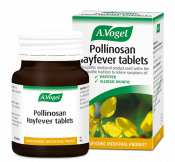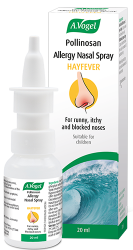Allergic rhinitis and itchy eyes
When suffering from allergic rhinitis, allergens like pollen and animal dander can cause itchy eyes. When these allergens land near or in the eye, it results in a frustrating itch. However, this problem is exacerbated by the release of the chemical histamine which is the immune system’s attempt to get rid of these kinds of allergens. Histamine can cause inflammation and itchiness all over the body, including around the eyes.
Allergic conjunctivitis is the name given to problems in the outer layer of the eye that are triggered by allergens. Such problems include itchiness, as well as swelling and redness.
What else can cause itchy eyes?
Itchy eyes aren’t always a sign of allergic rhinitis so it’s important to be aware of some of the other causes so that you don’t jump to any premature conclusions about the issue.
Contact lenses – wearing contact lenses for too long or failing to rinse them properly at the end of the day may cause watery eyes.
Contact lens solution – some people can react badly to contact lenses and their solutions which results in itchiness.
Cosmetic products – make-up, creams, soap and lotions all have the potential to cause watery and itchy eyes.
Weather – extreme changes in temperatures during the winter months can irritate the eyes and cause them to water. For example, moving from warm, heated homes to icy, outdoor air can shock the eyes.
How to tell if allergic rhinitis is causing itchy eyes
So, it turns out that there are quite a few things that can cause itchy eyes which, in turn, can make it difficult to determine whether allergic rhinitis is at the root of the issue. To help you make the distinction, here are a few things to consider.
Frequency – if itchy eyes are a regular issue for you it may be a sign that allergic rhinitis is the cause.
When – pollen is the most common cause of allergic rhinitis so if watery eyes become more problematic in the spring and summer months when plants pollinate, this may indicate that allergic rhinitis is the cause.
Where – dust mites, mould spores and animal dander also cause allergic rhinitis. All of these are found indoors so if you feel your symptoms worsening there, allergic rhinitis could be the reason for this.
What can you do?
To improve the problem of itchy eyes, there are a few simple things you can do.
Avoid histamine-rich food – things like caffeine, chocolate, walnuts, smoked meat, alcohol and cashew nuts are all high in caffeine so these are best avoided when you’re suffering from allergic rhinitis as they will only make symptoms more intense. Instead of these, you should rely on foods that are low in histamine such as fresh fruit and vegetables, chicken, fish and herbal teas.
Avoid rubbing your eyes – this triggers the release of more histamine which will only intensify your symptoms.
Place a clean damp cloth over the eyes – this has a soothing effect which may reduce the severity of itching.
Stay clear of triggers – removing or avoiding your trigger is an easy way to improve your allergic rhinitis symptoms.
Herbal remedies
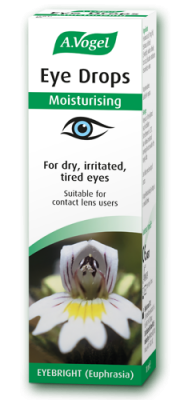 Moisturising Eye Drops – these can be incredibly helpful when suffering from allergic rhinitis symptoms such as itchy eyes. That’s because these eye drops deal directly with the problem of irritated, dry and tired eyes. Allergic rhinitis sufferers often prefer to opt for herbal help like this when dealing with their symptoms as they do not have the challenging side effect that conventional medications do.
Moisturising Eye Drops – these can be incredibly helpful when suffering from allergic rhinitis symptoms such as itchy eyes. That’s because these eye drops deal directly with the problem of irritated, dry and tired eyes. Allergic rhinitis sufferers often prefer to opt for herbal help like this when dealing with their symptoms as they do not have the challenging side effect that conventional medications do.
Pollinosan Hayfever Tablets – these address many of the symptoms associated with allergic rhinitis such as inflammation, itchiness and redness. As a result, they are ideal for helping to relieve the problem of itchy eyes. This herbal remedy can be used alongside other allergic rhinitis medications and, unlike conventional treatments, it does not cause and troublesome side effects like drowsiness.
Conventional treatments
Anti-histamines – these are called upon by doctors time and time again to treat allergic rhinitis as they block the release of histamine that occurs during an allergic reaction. This, in turn, reduces itching and inflammation.
Corticosteroids - these can also reduce swelling and inflammation and can be obtained from a doctor if symptoms are severe.
Eye drops – doctors are likely to prescribe eye drops for any itchy eyes that are the result of allergic rhinitis to help provide effective relief from the issue.





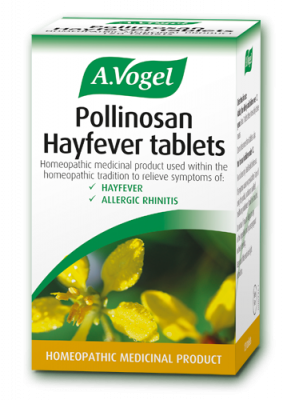
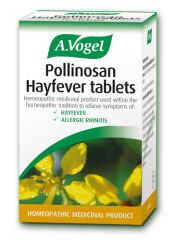 Looking for a solution to curb those hayfever symptoms such as itchy eyes, constant sneezing and congestion, then look no further than A.Vogel’s Pollinosan Hayfever tablets.
Looking for a solution to curb those hayfever symptoms such as itchy eyes, constant sneezing and congestion, then look no further than A.Vogel’s Pollinosan Hayfever tablets.
